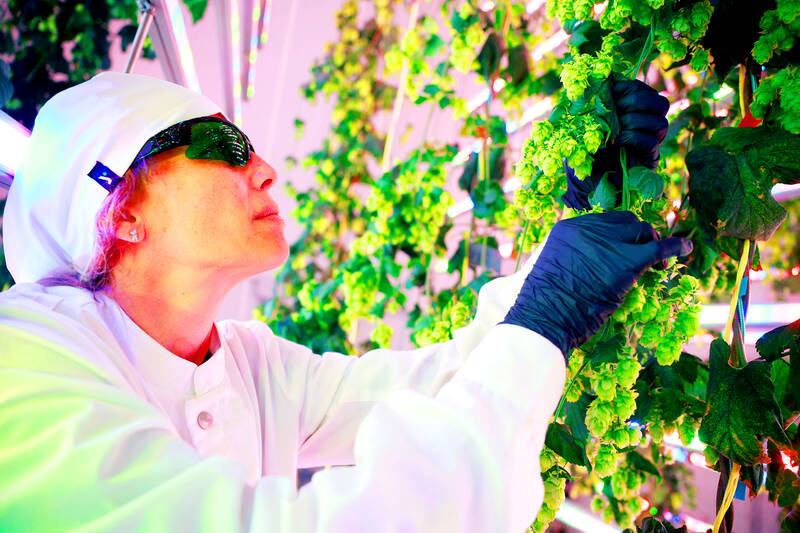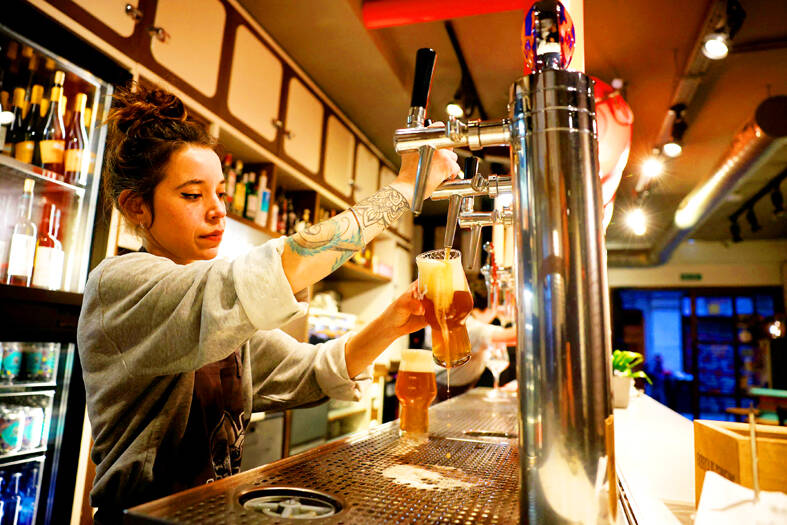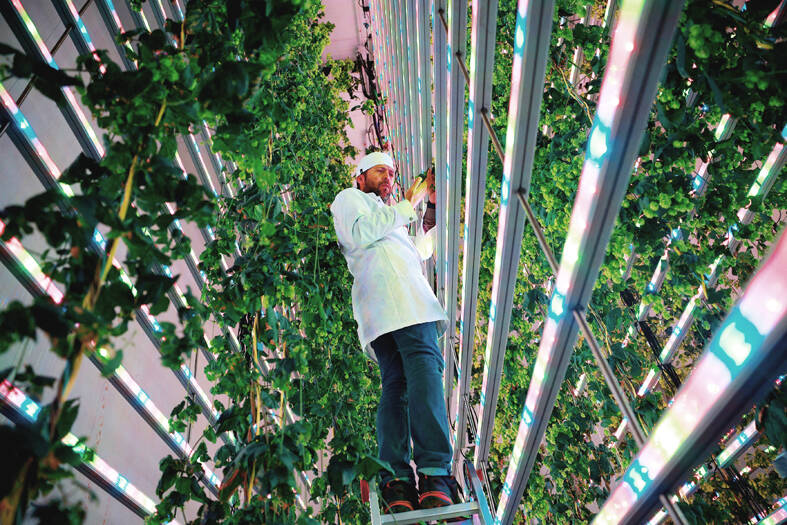In warehouses outside Madrid, twists of hop vines grow under LED lights and close supervision in what their guardians say could be the best way to futureproof the supply of a key ingredient in the world’s most popular alcoholic drink, now threatened by climate change.
Due to their need for “goldilocks” conditions of long summer days and mild temperatures, hops are traditionally grown in temperate climes found in areas like Germany’s Hallertau area, the Czech Republic or the northwestern US.
However, research shows that more frequent droughts and plagues due to global warming are driving down both yields and quality — a growing headache for the beer industry.

Photo: Reuters
US production was down 12 percent year-on-year last year, while German output saw a 21 percent decline and Czech yields fell by more than 40 percent due to abnormally hot and dry growing conditions, growers’ associations say.
Spain’s Ekonoke is seeking a solution by cultivating the water-intensive vines indoors through renewable-powered hydroponic systems that use nearly 95 percent less water than traditional outdoor farming.
“We’re on a mission to save the world’s beer,” Ekonoke chief executive and cofounder Ines Sagrario said.

Photo: Reuters
Warning: Excessive consumption of alcohol can damage your health
The start-up’s 11-member team of agronomists, chemists and biotechnologists tinkers with combinations of light and fertigation — the blending of fertilizers and water — at its test facility near Madrid, seeking the “secret sauce” that best suits each variety.
The ultimate goal is to maximize production of alpha-acids and essential oils that impart the bitter and fruity aromas so cherished by craft beer enthusiasts.
Dozens of sensors hooked to the leaves, roots and stems of the tall-growing climbers measure every parameter, from humidity to carbon dioxide levels, as changing wavelengths from LED lights give the repurposed warehouses a nightclub-like feel.

Photo: Reuters
“These hops have never seen any sunlight, only our own light show,” Ekonoke co-chief scientific officer Javier Ramiro said.
Strict hygiene measures such as protective clothing for staff ensure the space remains pest-free, taking the pesticides on which traditional farming often depends out of the equation.
To fund its research and expansion plans, Ekonoke has partnered with the Hijos de Rivera SA, makers of the popular Estrella Galicia brand, who have developed a limited edition IPA using Ekonoke’s hops that is already on tap in a bar in Madrid’s hip Chueca neighborhood.
Their next step is to upscale production to three rooms of up to 400 plants each from several dozen at a 1,200m2 pilot facility in northwestern Galicia. There, they plan to test automated postharvest processes.
Indoor plantations could ideally be set up next door to brewers, acting as a carbon sink by reusing the carbon dioxide emitted during fermentation to speed up the plants’ photosynthesis and recycling filtered water residues left over from the manufacturing, Sagrario said.
The start-up is also part of industry giant Anheuser-Busch InBev NV’s 100+ sustainability accelerator program.
Anheuser-Busch InBev’s director for global hops procurement, Willy Buholzer, said the key question for “very promising” ventures such as Ekonoke is whether they can grow and sell premium hops that are able to compete against more than 1,000 years of history in a sometimes conservative sector with conservative consumers.
“You should not underestimate traditional [outdoor] hop growers. They always come up with new ideas,” he added.
The most obvious challenge indoor farming faces is its high energy cost, he said.
However, he said he is optimistic that soaring energy prices would normalize, while the added value of a secure supply of special varieties and more frequent harvests resulting in higher yields per hectare could make indoor farming competitive in pricing.
“Demand from breweries is quite inelastic; you can’t make beer without hops and they don’t want to produce less,” Sagrario said.
Ekonoke’s endgame is to set up indoor plantations all across the globe, she said.
“This can be grown anywhere: Madrid, Sevastopol or Timbuktu,” she added.

DIVIDED VIEWS: Although the Fed agreed on holding rates steady, some officials see no rate cuts for this year, while 10 policymakers foresee two or more cuts There are a lot of unknowns about the outlook for the economy and interest rates, but US Federal Reserve Chair Jerome Powell signaled at least one thing seems certain: Higher prices are coming. Fed policymakers voted unanimously to hold interest rates steady at a range of 4.25 percent to 4.50 percent for a fourth straight meeting on Wednesday, as they await clarity on whether tariffs would leave a one-time or more lasting mark on inflation. Powell said it is still unclear how much of the bill would fall on the shoulders of consumers, but he expects to learn more about tariffs

NOT JUSTIFIED: The bank’s governor said there would only be a rate cut if inflation falls below 1.5% and economic conditions deteriorate, which have not been detected The central bank yesterday kept its key interest rates unchanged for a fifth consecutive quarter, aligning with market expectations, while slightly lowering its inflation outlook amid signs of cooling price pressures. The move came after the US Federal Reserve held rates steady overnight, despite pressure from US President Donald Trump to cut borrowing costs. Central bank board members unanimously voted to maintain the discount rate at 2 percent, the secured loan rate at 2.375 percent and the overnight lending rate at 4.25 percent. “We consider the policy decision appropriate, although it suggests tightening leaning after factoring in slackening inflation and stable GDP growth,”

Meta Platforms Inc offered US$100 million bonuses to OpenAI employees in an unsuccessful bid to poach the ChatGPT maker’s talent and strengthen its own generative artificial intelligence (AI) teams, OpenAI CEO Sam Altman has said. Facebook’s parent company — a competitor of OpenAI — also offered “giant” annual salaries exceeding US$100 million to OpenAI staffers, Altman said in an interview on the Uncapped with Jack Altman podcast released on Tuesday. “It is crazy,” Sam Altman told his brother Jack in the interview. “I’m really happy that at least so far none of our best people have decided to take them

As they zigzagged from one machine to another in the searing African sun, the workers were covered in black soot. However, the charcoal they were making is known as “green,” and backers hope it can save impoverished Chad from rampant deforestation. Chad, a vast, landlocked country of 19 million people perched at the crossroads of north and central Africa, is steadily turning to desert. It has lost more than 90 percent of its forest cover since the 1970s, hit by climate change and overexploitation of trees for household uses such as cooking, officials say. “Green charcoal” aims to protect what